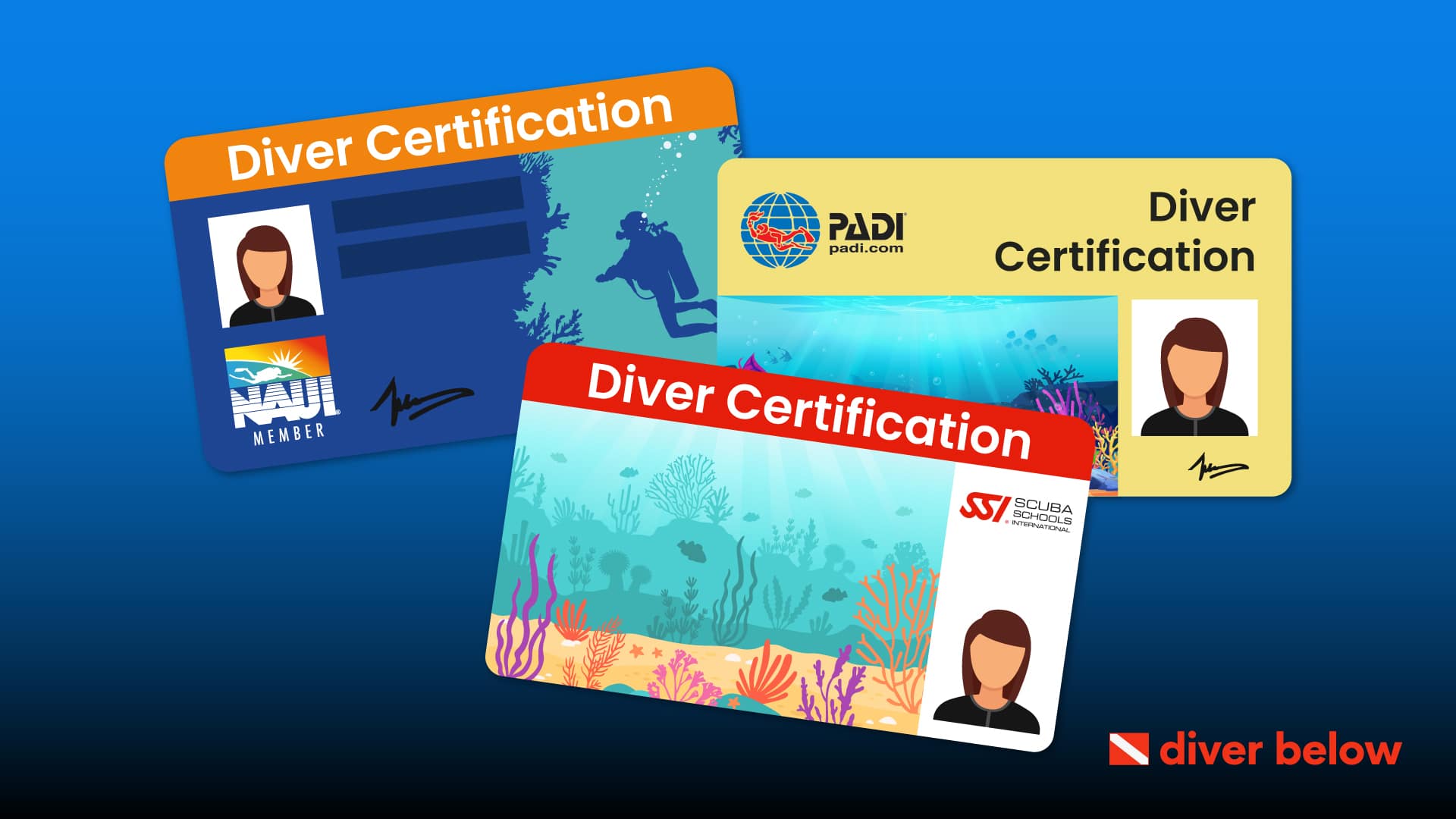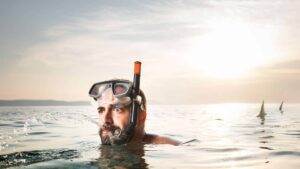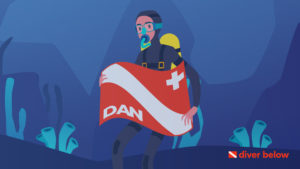Scuba is an acronym, meaning “Self-Contained Underwater Breathing Apparatus.”
It’s a type of underwater diving where you carry your breathing equipment.
Instead of coming up periodically to breathe surface air, divers have an air tank they carry with them.
This approach allows scuba divers to explore for longer periods than other types of diving.
But you probably know that, which is why you’re looking to learn more about scuba certifications.
Before we dive into too far into that though, let’s recap for those who don’t know the basics.
Contents
- What is Scuba Diving? A Primer
- Do I Need to Get Certified?
- Types of Common Scuba Certifications
- Specialty Scuba Certifications
- What Does a Scuba Diving Certification Teach?
- How Long Does a Scuba Certification Take?
- How Much Does a Scuba Certification Cost?
- What Gear Will I Need?
- Scuba Certification Agencies
- How Long Is a Scuba Certification Valid?
- Best Places to Get Scuba Certified
- Frequently Asked Questions
- Wrapping Up
What is Scuba Diving? A Primer
Scuba diving is a fun way to explore the underwater world, but you want to do it safely.
Getting your scuba certification gives you all of the knowledge and skills you need to go on a diving adventure.
Because you’re underwater for such a long time, you need to learn how to breathe with the right equipment.
You also have to learn hand signals to communicate with other divers.
Navigation is also important since you’re in the ocean.
In addition to basic diving safety skills, you’ll also learn about things specific to scuba diving.
This includes understanding how to read your pressure and depth gauges so you stay safe.
You’ll also learn about possible dangerous situations and how to react so you feel prepared for a dive.
Do I Need to Get Certified?
No, you don’t need to get certified, but it’s safer to have it.
When you get certified, you’re not just passing a test—you’re learning what to do in the water and how to make the most of your dive.
You never know what might happen in open water, so you want all of the knowledge and experience you can get before putting your life at risk.
Can I Dive Without Getting Certified?
Some resorts have the option to do shallow dives in warm water, and scuba certification doesn’t seem necessary.
But scuba diving can be dangerous if you don’t know what you’re doing, so it’s best to get certified.
Most dives happen without a hitch, but just in case you get startled or encounter a problem, you’ll want to know what to do.
Types of Common Scuba Certifications
Professional agencies categorize scuba certifications depending on what skills you have and what you’re capable of.
Each level will have different requirements in terms of classroom hours and training time.
You also have to pass a written or skills test to complete each certification.
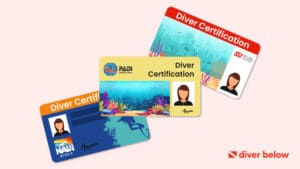
Open Water Diver
Open Water Diver certifications are basic diving licenses.
Once you have this certification, you can:
- rent diving equipment
- go on boat dives
- dive alone or with a buddy
- dive as deep as 60 feet
This certification paves the way for anything else you want to do.
You can stop there or go on for advanced or professional certifications.
Advanced Open Water Diver
After you’re an Open Water Diver, you can go for the advanced certification.
Completing this shows that you have the skills to night dive, investigate shipwrecks, and practice underwater photography.
In addition to the skills for the open water diver certification, this level shows that you can confidently navigate underwater and have great buoyancy skills.
[testimonial author=””]If you like playing with a camera, you should look into getting an Underwater Photography certification.
In that course, you’ll learn how cameras interact underwater, and how to take stunning pictures of marine life.[/testimonial]
Master Diver
A Master Diver must have five specialty certifications, such as Scuba Diver, Open Water Diver, Advanced Open Water Diver, and Rescue Diver.
You must also log at least 50 dives before you’re a master.
Specialty Scuba Certifications
There are many specialty scuba certifications you can earn if you’re interested in a certain field.
You might also choose to complete several of these to become a Master Diver.
Nitrox
Nitrous oxide diving, or nitrox, is a step above scuba diving.
Your air tank has more oxygen and less nitrogen so you can stay underwater longer.
It also prevents decompression sickness when you return to the surface.
As a result, you can dive without needing to rest for long.
You need to understand different tank levels for this certification.
Deep Diving
The standard depth for scuba diving is 60 feet, so if you want to go deeper, you need the deep dive certification.
This course helps you plan deeper dives, manage your air supply accordingly, and stay buoyant at such depths.
Wreck Diving
When you train to become a wreck diver, you not only need scuba skills but also understand how to interact with a shipwreck.
It’s crucial to leave the environment as you found it and explore only for your knowledge.
You don’t take things but instead, map and survey the wreck visually.
Rescue Diving
A Rescue Diver certification gives you the skills to help others in the water.
You need CPR and first-aid training before attempting this course because you’ll administer care if necessary.
You’ll also learn how to spot distress in other divers, respond to emergencies, and rescue impaired or unresponsive divers.
What Does a Scuba Diving Certification Teach?
Scuba diving certification teaches you how to feel safe, comfortable, and confident in the water.
You’ll learn how to plan dives and choose the scuba gear that best suits you.
You’ll learn the signals to use underwater to communicate with your dive buddy.
After you have the basic knowledge, you get the chance to test them in the water.
The information provides a solid foundation, but you want to make sure you know how to put on the gear and breathe properly.
Getting in and out of the water is something you shouldn’t overlook in your certification process.
You want to stay safe and understand how to control your buoyancy.
Once you’re comfortable in the water, you’ll practice underwater navigation and other safety protocols.
While much of the information in the scuba certification process is crucial to your well-being in the water, your instructor will also offer tricks to empower you on your dives.
Learning how to get water out of your mask is one such trick that you’ll use more than you realize.
How Long Does a Scuba Certification Take?
The length of time it takes to complete your scuba certification will vary.
It depends on your schedule and how the instructor assesses your skills.
You can take as much time as you need with the knowledge-based portion of the course.
Once you start diving, the instructor will ensure you master skills before moving you on.
The focus of the certification process isn’t about how quickly you can finish.
Instead, the instructor will focus on ensuring you’re comfortable and confident with the equipment, in and out of the water.
This is a great way to complete the course because you’ll get the most out of the experience and become a better diver in the long run.
Overview of How Long It Takes
You can complete your scuba certification in about a week, depending on various factors.
You can complete the eLearning, knowledge-based portion of the course on your own time.
If you feel capable, you can complete this quickly.
Alternatively, you might choose to stretch out this work to ensure you learn everything.
After taking the final exam, you’re ready for confined water dives.
These are in a swimming pool near your home.
You can practice diving and swimming with the equipment as much as you need to feel comfortable.
You’ll have an instructor for this part of the course.
The open water dives take place over two days.
You have the opportunity to dive both mornings and afternoons to experience different conditions.
Only the open water dives have a set period of two days.
You can complete the rest of the coursework at your pace, according to your comfort level.
While it’s nice to know that you can get certified quickly, make sure you’re retaining the information so you’ll feel confident diving in open water.
Phases of Scuba Certification
Before you dip your toes in the water, you’ll need to do some coursework for your scuba certification.
There are three phases to the process: classroom work, pool time, and checkout dives.
1. Classroom Work (Knowledge Development)
You can complete the knowledge development portion of the certification online.
The course material teaches you the terminology related to scuba diving.
You’ll watch videos so you can understand the entire process.
You’ll also learn about the safety protocols for dives.
Since it’s online, you can complete this portion at your own pace, whenever and wherever you have time.
The course includes study guides so you’re prepared for the final exam.
2. Pool Time (Skills)
The second phase of the scuba certification requires you to practice diving in the confined water of a pool.
It gives you a controlled environment to practice everything you learned in the knowledge development phase.
You’re finally able to use the gear and practice breathing with the equipment.
When you pass this phase, you’re technically a certified diver.
The official agency has deemed you experienced enough to know what you’re doing—as long as you’re in a pool.
3. Checkout Dives (Demonstrating Proficiency)
No one wants to be stuck diving in a pool, so you have to complete the final phase of open water certification to be completely certified.
You’ll dive in the ocean four times to demonstrate proficiency.
This part of scuba certification takes two days, and you’ll do both a morning and afternoon dive each day.
Since you must complete it in the ocean, you can schedule it in advance so you have time to travel to your chosen body of water.
How Much Does a Scuba Certification Cost?
The cost of a scuba certification course will vary depending on what agency you use.
You can complete the knowledge part of your certification online and the course will cost about $195 through official agencies.
Once you complete that portion, you can schedule your pool dive, which costs $200 or more.
After completing both of those phases, you’ll schedule the open water portion of the course.
This might be more expensive, depending on where you live.
If you’re close to the ocean, then it’s no problem.
If you live farther away, you’ll want to schedule this phase around a vacation so you have time to dive.
Therefore you’ll spend money on the course itself along with your travel fees.
What Gear Will I Need?
Getting certified means you’re serious about scuba diving, so some scuba gear is worth the investment.
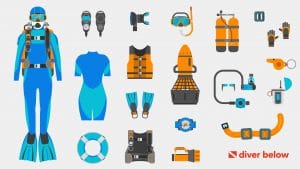
1. Mask and Snorkel
Having a properly-fitted scuba mask and snorkel will make all of the difference in your dives.
You want something that feels comfortable so you’re able to focus on the experience rather than what’s on your face.
2. Fins
Dive fins are another piece of gear that requires a personal fit.
You want to feel comfortable and confident in the water, so let the professionals at your dive shop help you find the right pair.
Suggestion: Rent Gear Before Buying It
Renting gear is a great option if you’re on a budget or aren’t sure about the specific items you’ll need.
You’ll always rent vests and tanks from the scuba site, so there’s no need to think about buying those.
Most diving courses include a package with equipment including the regulator, buoyancy control device, dive computer, weight system, and more.
If you’re unsure of what the dive shop provides, call them to check before buying any gear.
While you can buy your own wetsuits, it’s not necessary.
You’ll need different suits depending on the water temperatures where you’re diving, so you can rent those as well.
Scuba Certification Agencies
There are many official agencies that offer scuba lessons.
Going through one of these organizations for your training ensures you’re getting the best knowledge and experience.
PADI
The Professional Association of Diving Instructors (PADI) started in 1966 and is the worlds’ largest diving organization.
They were the first organization to issue a scuba certification card.
SSI
Founded in 1970, Scuba Schools International (SSI) teaches scuba certification courses and supports dive businesses.
They have dealers and resorts around the world.
NAUI Worldwide
The National Association of Underwater Instructors (NAUI) started in 1960 as a nonprofit organization of scuba instructors.
Since then they have created dive certification courses and international diving standards.
SDI
One of the newer organizations, founded in 1998, is Scuba Diving International (SDI).
It’s the recreational side of Technical Diving International, which trains professional divers.
How Long Is a Scuba Certification Valid?
Once you complete the process, your scuba certification is good for the rest of your life.
Most organizations offer courses to keep your knowledge up to date.
You can also take courses to advance your scuba certification or learn additional skills.
Best Places to Get Scuba Certified
Contact your local dive centers to see if they have qualified instructors on staff.
You’ll want to learn from someone affiliated with the previously mentioned agencies, including PADI, SSI, NAUI Worldwide, and SDI.
You can take the knowledge portion of the certification online at your leisure.
The second phase of certification requires a pool, so you can stay local and schedule it at your convenience.
When you’re ready for open water, you’ll have to travel to the nearest ocean and book the final part of your coursework there.
Frequently Asked Questions
You now have a solid foundation of information about acquiring your scuba certification.
The answers to these frequently asked questions will help ensure you’re ready to pass the test.
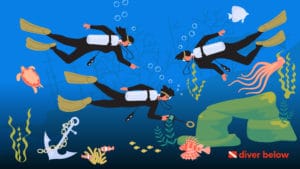
Do I need to be a good swimmer to take scuba classes?
You don’t need to qualify for the Olympics, but you need to have some basic swimming skills.
If you’re not sure about your swimming abilities, the course instructor can evaluate you.
First, they ask you to swim 200 yards while wearing a mask, snorkel, and fins.
This exercise isn’t timed; they just want to see you in action.
Next, they’ll have you float and tread water for 10 minutes.
They’ll also look over your medical questionnaire to make sure you can handle the course and diving in general.
How likely is it that I’ll pass my scuba class?
You’ll likely pass.
Certification is open to anyone older than 10 years, so all of the information is accessible.
People with allergies, disabilities, and other medical conditions can earn scuba certifications, so you should feel confident in your abilities.
Remember, all of the information and water experience is to educate you.
The agencies aren’t trying to fail people; they want to empower you with as much knowledge as they can.
Can I do my certification dives on vacation?
Yes, you can get certified on vacation.
If at all possible, you should complete the online knowledge portion of the course at home.
This gives you more time for water experience on vacation.
While you can complete the pool dives in your hometown, too, it won’t take too long to do at your destination.
When you’re booking your vacation, try to schedule your open water dives for the beginning of your stay.
This will give you extra time to dive once you’re certified and you’ll get the most out of your vacation.
Wrapping Up
Scuba certification is a fun way to explore the open waters of the ocean.
Invest in yourself to become certified and investigate the coral reef and everything else below the water’s surface.
Contact your local dive shop to start your certification process today.
